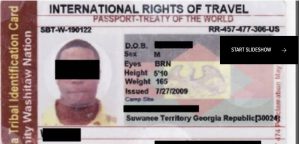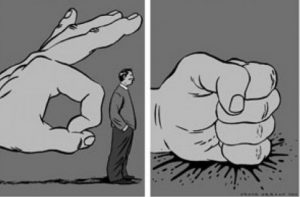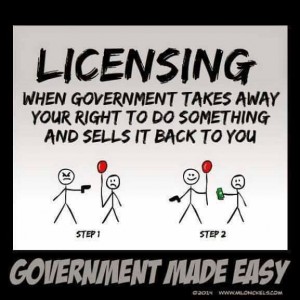Driving

LewRockwell.com | Eric Peters
H.G. Wells wrote his novel, War of the Worlds, in 1898 – when a “driver” was someone who drove horses, as in commercially.
In italics for a reason.
Or rather, a definition.
Today, we use the term, “driver” to refer to someone who operates a motor vehicle, privately. Is the distinction important?
Maybe.

Is it possible the people who assert that the law does not oblige people who simply operate a private motor vehicle for personal use to get (and present) a license – because they are not drivers, as in the commercial sense, might be right? They are arguably right as a matter of common law and general tradition in that until relatively recently, human beings have always been understood to have a right to travel. Put another way, until relatively recently – around the dawn of the 20th century – no one had to obtain a license – that is to say, government permission – to travel by horse or carriage or any other privately owned conveyance.
People just went where they wanted, when they wanted – using the public right-of-way. These being the roads, which everyone had a right to use.

Somehow, what had been a right transitioned into a conditional privilege, one granted by the same government that had the power to revoke it. Sovereign Citizens deny the government’s right – its authority, rather – to turn a right into a conditional privilege and on this they are on solid ground, as a moral (if not legal) matter. The government can do as it likes, of course – because government has power, which it uses to assert the extent of its authority, which it defines for itself.
Some labor under the misapprehension that government is merely an instrument of “the people” and “represents” them, acting only insofar as “the people” have authorized. This is nonsense, of course – but it requires not allowing terms such as “the people” or “represents” to pass unchallenged.

Or rather, undefined.
“The people” is taken by some (foolish) people to mean, in effect, everyone. As in all of us. But it is in fact only some of us; i.e., “the people” who hold government offices and exercise government authority over everyone, at the behest and with the approval of some of “the people.”
This is “democracy” dissected.”
But what of the people who do not hold government office – nor wish to – and disapprove of what those who do inflict upon them as well as others? There are many such people as there is not a single example, probably, of an exercise of government authority that everyone agrees with. Certainly not with respect to the laws that are just legalisms – i.e., laws pertaining to actions (or non-actions) that involve no injury done to anyone, such as the having or not having a “license” to “drive” your vehicle on the public right-of-way.
The assertion is that such laws – such legalisms – are binding on everyone because “the people” have so decided, via their “representatives.” A cretinous article to this effect appeared recently in Jalopnik – a “car” site that is to cars (and operating them) what Dr. Fauci is to health.
The article’s author writes – as regards this business of being obliged to seek government permission to use the public right-of-way:
“You may have heard the term sovereign citizens popping up occasionally in the news and wondered, what’s that all about? Well, it’s a conspiracy theory, a way of life, a right-wing grift and a pain in the ass for everyone trying to have a society around them—all at once.”
Apparently, rights are a “pain in the ass” for some people. The people who say you are “represented” – and so agreed.
But this is specious as well. A representative is someone who represents you – specifically. Not anyone else. If he represents anyone else then he is not your representative.

But you were given a chance to vote for – or against – this person who wields government authority as one of its elected “representatives” of “the people.” More nonsense. Or at least, more pettifoggery. The fact remains that if your alleged “representative” acts in any way contrary to the ways you told him to act then he does not represent you. Especially if you didn’t even vote, because you have no interest in being “represented” by anyone who isn’t bound to act only insofar as you have given him authorization to – and no more.
None of us would accept being “represented” by a lawyer on any other basis. And we’d never tolerate being told by some lawyer that he “represents” us – because some other people “voted” for him. And yet, this is operationally exactly what the people styled our “representatives” do – and claim to be morally (as well as legally) legitimate.
It is how these people turned what had been the right to travel into a conditional privilege, via among other things laws requiring people to obtain a “license” – that is, permission – from the government to exercise it. The mechanism by which this was achieved may have been some etymological legerdemain – i.e., the conflation of the right-to-travel with “driving,” a commercial activity over which government had already asserted its authority, as via the regulatory power over commercial activity government acquired for itself when the Constitution replaced the Articles of Confederation, which were simply tossed in the trash by “representatives” who had not been authorized by any of “the people” – excepting themselves – to do so.
The Constitution contained language about “regulation” – and that (along with similar terms such as “necessary and proper,” the “general welfare”) gave government all it needed to turn what had been a right into a privilege.
We’re all “drivers” now.
Just was we’re all “customers,” too.
Original Article: https://www.lewrockwell.com/2023/03/eric-peters/driving/

Comments ()